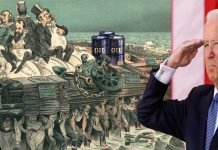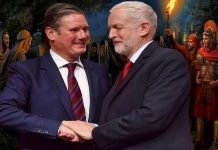The Labour leader has called for injunctions against green protesters. Now it has emerged two of his biggest donors were motor industry chiefs.
Open democracy points out in their recent article by Caroline Molloy that two of the biggest donors to Sir Keir Starmer’s leadership campaign are former motor industry bosses, it has emerged, after Labour faced a backlash for siding with the Tories against anti-oil campaigners.
Last week the Labour party called for an “immediate nationwide ban” to block the on-going “Just Stop Oil” demonstrations that have seen climate protestors at UK oil terminals.
The news comes after a fortnight of protests by the Just Stop Oil group, which blocked tankers and refineries to put pressure on the government over its continued investment in fossil fuels.
Protests have caused “misery” for motorists, the Labour Party said in a statement on last Monday, citing statistics published by the Campaign for Fair Fuel that says around one in three petrol stations in southern England have been forced to close.
Labour said it “would not just ban protests at oil terminals but also across Britain’s road network”.
Its shadow justice secretary, Steve Reed, continued the party’s call for “immediate injunctions” to claiming it was to protect “people facing misery trying to get to work”. His words echoed those of Tory environment secretary George Eustice, who said the protesters were “trying to cause havoc with people’s lives”.
Labour’s forceful attack on the protesters comes as it demands the government bring in an injunction that would ban protests not only at oil terminals but also to stop them across Britain’s roads network.
“An injunction would simplify police operations by enabling them to more easily make arrests,” the statement says.
Sharing an article from The Sun about the “eco-warrior protests” on its official Twitter account last week, Labour said: “Motorists were already being hammered by prices at the pump, and now millions can’t even access fuel. The government must immediately impose injunctions to put a stop to this disruption.”
Throughout the Labour leadership election, Starmer consistently refused to name the full list of those who donated to his campaign.
Starmer’s lack of transparency was challenged by fellow candidates. In February, Rebecca Long-Bailey published a full donor list of those who offered more than £1,500 to her campaign. Starmer, the front-runner, did not follow suit.
Starmer’s used the letter of the law, eventually publishing his donors only after the vote was in.
Amongst those donors, Starmer received £50,000 from former RAC and AA boss Trevor Chinn, and £25,000 from AA’s former chief financial officer, Martin Clarke. These were two of the six largest sums he received.
In accepting the donations in late March, Starmer was not required to register his interests until after the polls closed on 2 April. The Register of Members’ Interests shows that Chinn’s donation was registered on 9 April.
Chinn has spent a lifetime in the motor industry and has chaired and invested in many leading motoring organisations. In the 2000s, he chaired the AA, the RAC and Kwikfit, as well as traffic information company ITIS Holdings and Streetcar Limited (the UK’s largest car club operator). He also chaired the government’s Motorists’ Forum between 2000 and 2010.
Later, he took stakes in car fleet giant Tusker and the UK’s largest car club operator, Streetcar. According to Companies House, the 86-year-old is still a director of Whocanfixmycar.com. Chinn also donated £1,000 to Steve Reed in August 2019.
Of course, there are other groups Chinn is active within. Trevor Chinn, a member of the executive committee of the British Israel Communications and Research Centre (BICOM).
According to Electronic Intifada, BICOM is a “British pro-Israel lobby group”. The Guardian reported on BICOM in 2009, saying:
Britain’s most active pro-Israeli lobbying organisation – which flies journalists [including Guardian staff] to Israel on fact-finding trips and organises access to senior government figures – has received nearly £1.4m in two years from a billionaire donor whose father made a fortune manufacturing arms in Israel.
Labour said it ‘would not just ban protests at oil terminals but also across Britain’s road network’
Today #JustStopOil demand @10DowningStreet get a grip, stop lying, stop recklessly destroying our future.
— JustStopOil (@JustStop_Oil) April 11, 2022
Start by ending new oil & gas.
We will continue to disrupt until the govt makes a statement that it will end new oil & gas projects in the UK. https://t.co/5gawVEgJck
On 3 February 2020, Starmer also received £25,000 towards his leadership campaign from Martin Clarke, an outspoken critic of Jeremy Corbyn. From 2014 until April 2019, Clarke was chief financial officer of the AA, when he stood down “to return to my twin passions of private investing and politics”.
Clarke remained under contract for a further 12 months, acting as a consultant, The Times reported at the time. Clarke, a long-time Labour member and private equity investor, has also donated £10,000 to Progress, a Labour group seen as the voice of the party’s right wing, and £37,500 to Yvette Cooper. He has also donated to ill-fated centrist party Change UK.
A spokesperson for Just Stop Oil criticised Labour over its call for “draconian court injunctions”, reminding the party it was “born out of a tradition of struggle and resistance”. They accused Labour of “betraying its past, betraying the youth of this country, of every country and [being] complicit in climate genocide”.
Echoes of traditional Labour
Asked about the Labour party’s comments, Jamie Driscoll, the metro mayor of the North of Tyne, said that history always judged protesters differently to the “establishment of that era”.
“Were the suffragettes dangerous radicals who refused to understand their place?” he said. “Were the Tolpuddle Martyrs treasonous conspirators for wanting fair pay? Were the Stonewall rioters immoral to want gay liberation? Was Nelson Mandela just a subversive terrorist? What’s the Labour party for if it’s not to fight for a better world? Protest is an essential part of a healthy democracy. If an individual oversteps the mark, there are already laws in place. The police don’t need new powers.
“If you’re not doing something about the climate emergency, it’s probably because you don’t understand quite how dangerous it is. Either that, or you’re profiting from destroying our planet. These protests shouldn’t even be needed – ending fossil fuel investment is economic and environmental common sense. Our government should be investing in renewable energy, clean public transport and insulating homes. Yet, Boris Johnson, Rishi Sunak and co are actively encouraging new oil and gas fields in the North Sea.”
Trouble at mill.
There is also a growing grassroots backlash on Labour’s left wing over the party’s official stance. Chris Saltmarsh, co-founder of Labour for a Green New Deal, said his group was “seriously concerned to see Labour’s frontbench calling for such a harsh response to peaceful protest calling for action on the climate crisis”.
“The protesters demand to stop new fossil fuel extraction is a basic one which should be uncontroversial to a Labour party claiming commitment to decarbonisation and a Green New Deal,” he said. “Instead of trying to outdo the government on petty authoritarianism, Starmer and his team should focus on making the case for a positive and transformative vision to tackle both the climate and cost of living crises.”
Prioritising policing
Labour is focusing on ‘law and order’ in the run-up to local elections, amid criticism from home secretary Priti Patel, who sought to blame the fuel protests on Starmer’s party.
Referring to the Police, Crime, Sentencing and Courts Bill, Patel claimed Labour had “repeatedly voted against our proposals that would have given the police extra powers to deal with this eco mob”. The bill faced opposition in Parliament and the House of Lords watered down some of its most draconian anti-protest elements.
Labour, however, whipped its Lords members to abstain on another key part of the law, which will effectively criminalise Gypsy, Roma and Traveller communities’ way of life by creating new offences, meaning it cannot now be removed. Just nine peers rebelled.
According to the Guardian, Senior figures in the party are relishing any battle, however. A Labour source said the party was taking the stance for the simple reason that it was “where the voters are”. They added: “It’s a common-sense position. Our position on climate change is strong and this doesn’t change the fact we think it’s the most pressing issue facing the planet, but we’re recognising you don’t solve it by annoying workers.”
Sir Keir Starmer’s office did not respond to a request for comment.
Support Independent Journalism Today
Our unwavering dedication is to provide you with unbiased news, diverse perspectives, and insightful opinions. We're on a mission to ensure that those in positions of power are held accountable for their actions, but we can't do it alone. Labour Heartlands is primarily funded by me, Paul Knaggs, and by the generous contributions of readers like you. Your donations keep us going and help us uphold the principles of independent journalism. Join us in our quest for truth, transparency, and accountability – donate today and be a part of our mission!
Like everyone else, we're facing challenges, and we need your help to stay online and continue providing crucial journalism. Every contribution, no matter how small, goes a long way in helping us thrive. By becoming one of our donors, you become a vital part of our mission to uncover the truth and uphold the values of democracy.
While we maintain our independence from political affiliations, we stand united against corruption, injustice, and the erosion of free speech, truth, and democracy. We believe in the power of accurate information in a democracy, and we consider facts non-negotiable.
Your support, no matter the amount, can make a significant impact. Together, we can make a difference and continue our journey toward a more informed and just society.
Thank you for supporting Labour Heartlands












